Natural fibres like cotton in the Ord Valley region and industrial hemp growing in East Kimberley have been suggested as a sustainable solution for WA’s fashion industry issues of long supply chains and a high carbon footprint.
Focusing on fashion “circularity,” South Metropolitan TAFE lecturer Lisa Pillar, writer of the Curtin University-led State of Fashion and Textile Circularity in WA 2023 report, said, “[Natural fibres] could create a more localised production supply chain for the future.”
The report shows that demand is there, Ms Pillar said, “local industries were supportive of making use of more natural products…They are actually heavily favouring natural fibres such as cotton, linen, wool, and hemp."
Circular fashion, according to The Sustainable Fashion Forum, is a holistic design approach rooted in Indigenous ancestry that aims to “design out waste” – a closed-loop system making new materials out of old materials.
With the Australian fashion industry's sustainability issues beginning at the design stage, there are calls to support fibre-growing industries. "When we have rich, fibre-growing industries, other supporting systems start to pop up a bit like we're seeing with processing and classing facilities," said former Vogue sustainability editor Clare Press.
"It makes sense if you could create an economy or an industry associated with textiles — and certainly if that cotton was available, or forms of that — we would definitely like to purchase that from WA," said Ms Yu, manager at Nagula Jarndu Women's Art and Resource Centre in Broome. Nagula Jarndu has a strategic view towards a more self-sustainable business model; the organisation has given Aboriginal women the opportunity to produce distinctive handcrafted textiles and textile products.
"The idea of being able to grow hemp fibre to produce PPE and procure uniforms in WA in the future would be a really exciting outcome if we could work towards that," said Ms Yu.
At Procurement Australia, we’re committed to supporting circular economy activities and outcomes throughout our procurement practices, and those of our suppliers. To help us all move away from wasteful linear economy models, we partner with suppliers who are committed to implementing a circular model, and connect them with members who want to achieve a more sustainable business model.





